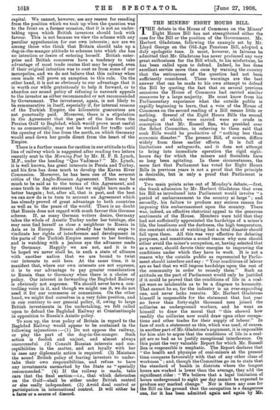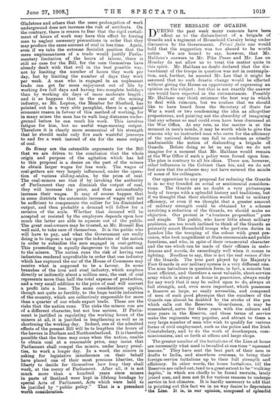THE WEINERS' EIGHT HOURS BILL. T HE debate in the House
of Commons on the Miners' Eight Hours Bill has not strengthened either the case for the Bill or the position of the Government. Mr. Herbert Gladstone, following the example set by Mr: Lloyd George on the Old-Age Pensions Bill, adopted a duly apologetic tone. It must, however, in fairness be admitted that Mr. Gladstone has never professed any very great enthusiasm for the Bill which, to his misfortune, he has been called upon to defend. Indeed, he has done excellent service more than once by warning the country that the seriousness of the question had not been, sufficiently considered. These warnings are the best answer that can be made to his own attempt to defend the Bill by quoting the fact that on several previous occasions the House of Commons had carried similar measures by a large majority. He must know from his Parliamentary experience what the outside public is rapidly beginning to learn, that a vote of the House of Commons on the second reading of a Bill means little or nothing. Several of the Eight Hours Bills the second readings of which were carried were so crude in conception , that Mr. Russell Rea, who presided over the Select Committee, in referring to them said that such Bills would be productive of "nothing less than economic disaster." The present Bill, of course, differs widely from these earlier efforts. It is full of limitations and safeguards, and it does not attempt to bring into immediate operation the rigid eight. hours day for which the miners and Socialists have so long been agitating. In these circumstances, the mere fact that Parliament has voted for Eight Houra Bills in previous years is not a proof that the principle is desirable, but is only a proof that Parliament is careless.
Two main points arise out of Monday's debate,—first, the frank admission by Mr. Herbert Gladstone that even his Bill as introduced into Parliament would involve "a period of embarrassment to the country at large " ; and secondly, his failure to produce any serious reason for imposing this embarrassment upon the country. There was, indeed, an effective rhetorical appeal to the generous sentiments of the House. Members were told that they had not sufficiently appreciated the hardships of a miner's life, the loneliness and the darkness, the high temperature, the constant strain of watching lest a fatal disaster should fall upon them. All this was very effective for debating purposes, and constitutes a sound reason why men should either avoid the miner's occupation, or, having selected that as a career, should devote their energies to improving the conditions under which they have to work. It is not a reason why the outside public as represented by Parlia- ment should interfere and say : "Your conditions of labour are so bad that we will impose hardships upon the rest of the community in order to remedy them." Such an attitude on the part of Parliament would only be justified if it could be proved that the conditions of life in a coal.. pit were so intolerable as to be a disgrace to humanity. That cannot be so, for the industry is an ever-expanding one, and never lacks recruits. .Mr. Herbert Gladstone himself is responsible for the statement that last year no fewer than forty-eight thousand men joined the collieries as underground workers, and he went on himself to draw the moral that "this showed how readily the collieries now could draw upon other occupa- tions and other trades for their supply of labour." In face of such a statement as this, which was used, of course, in another part of Mr.Gladstone's argument, it is impossible for him also to argue that the conditions of life in a coal- pit are so bad as to justify exceptional interference. On this point the very valuable Report for which Mr. Russell Rea is responsible is emphatic. The Report declares that "the health and physique of coal-miners at the present time compares favourably with that of any other class of workmen"; ; and, though the Committee go on to state that the standard of health in districts where the longest hours are worked is lower than the average, they add the significant rider : " We believe that a legal limitation of hours underground to eight per day cannot be expected to produce any marked change." Nor is there any case for the Bill on the ground that the occupation is a dangerous one, for it has been admitted again and again by Mr. Gladstone and others that the mere prolongation of work underground does not increase the risk of accidents. On the contrary, there is reason to fear that the rigid curtail- ment of hours of work may have this effect by forcing men to neglect necessary precautions in order that they may produce the same amount of coal in less time. Again, even if we take the extreme Socialist position that the mere unpleasantness of a trade would justify Parlia- mentary limitation of the hours of labour, there is still no case for the Bill, for the men themselves have already dealt with that evil in the best possible way, not by limiting the number of hours they work per day, but by limiting the number of days they work per week. A man who is engaged in an unpleasant trade can get far more enjoyment out of life by working five full days and having two complete holidays than by working six days of more moderate length ; and it so happens that in the case of the mining industry, as Mr. Lupton, the Member for Sleaford, has pointed out in a very able pamphlet, there is a special economic reason in favour of this method of working, for in many mines the man has to walk long distances under- ground before he can reach his work. This involves fatigue for him, but no useful wage-earning output. Therefore it is clearly more economical of his strength that he should make only five such wasteful journeys to and fro a week instead of six for the same output of coal.
So flimsy are the ostensible arguments for the Bill that we are driven to the conclusion that the whole origin and purpose of the agitation which has led to this proposal is a desire on the part of the miners to obtain larger wages for less work. The wages of coal-getters are very largely influenced, under the opera- tion of various sliding-scales, by the price of coal. The coal-miners see that if by invoking the authority of Parliament they can diminish the output of coal, they will increase the price, and thus automatically increase their wages. It may of course happen that in some districts the automatic increase of wages will not be sufficient to compensate the collier for his diminished output, and then probably a demand will follow for a revision of the scale. Whether that demand will be accepted or resisted by the employers depends upon bow much the latter are able to squeeze out of the public. The great coal-owners may be trusted, as Mr. Russell Rea well said, to take care of themselves. It is the public who will have to pay, and what the Government are really doing is to impose a tax upon the industries of the nation in order to subsidise the men engaged in coal-getting. This proceeding is equally dangerous to the nation and to the miners. The nation runs the risk of having vast industries rendered unprofitable in order that one industry which has captured the ear of the House of Commons may receive what is supposed to be a favour. In some branches of the iron and steel industry, which employs directly or indirectly about a million men, the cost of coal represents more than half the total expense of production, and a very small addition to the price of coal will convert a profit into a loss. The same consideration applies, though not quite so forcibly, to the huge textile industries of the country, which are collectively responsible for more than a quarter of our whole export trade. These are the risks that the nation runs. The risks the miners run are of a different character, but not less serious. If Parlia- ment is justified in regulating the working hours of the miners at all, it is justified in lengthening as well as in shortening the working day. Indeed, one of the admitted effects of the present Bill will be to lengthen the hours of the hewers in Durham and Northumberland. It is therefore possible that the time may come when the nation, unable to obtain coal at a reasonable price, may insist that Parliament shall compel the miners, under heavy penal- ties, to work a longer day. In a word, the miners in asking for legislative interference on their behalf have placed. one of their most precious liberties, the liberty to decide for themselves how long they shall work, at the mercy of Parliament. After all, it is not much more than a hundred years since miners in parts of Scotland were kept in lifelong bondage by special Acts of Parliament, Acts which were held to be justified by "public policy." That is a precedent worth consideration.























































 Previous page
Previous page